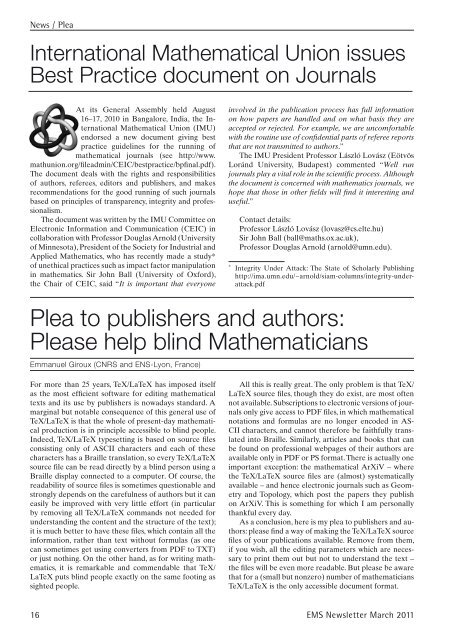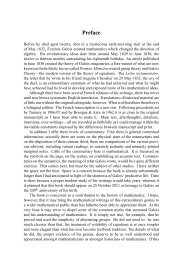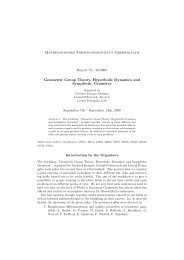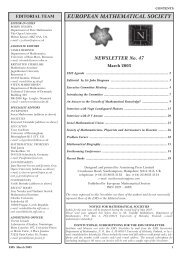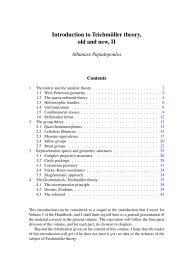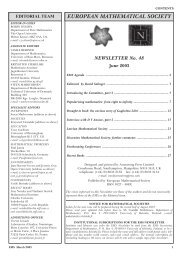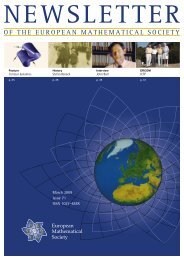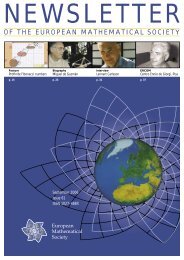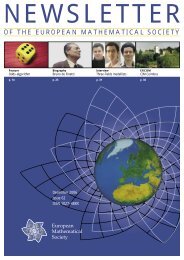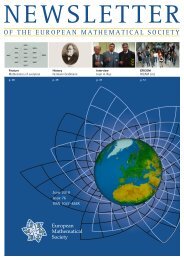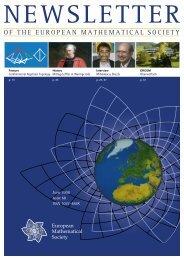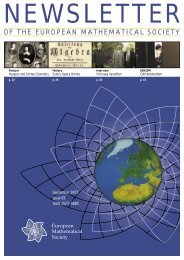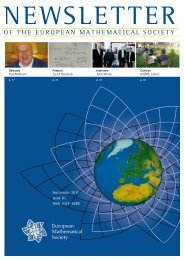Bulletin of Mathematical Sciences - European Mathematical Society ...
Bulletin of Mathematical Sciences - European Mathematical Society ...
Bulletin of Mathematical Sciences - European Mathematical Society ...
Create successful ePaper yourself
Turn your PDF publications into a flip-book with our unique Google optimized e-Paper software.
News / Plea<br />
International <strong>Mathematical</strong> Union issues<br />
Best Practice document on Journals<br />
At its General Assembly held August<br />
16–17, 2010 in Bangalore, India, the International<br />
<strong>Mathematical</strong> Union (IMU)<br />
endorsed a new document giving best<br />
practice guidelines for the running <strong>of</strong><br />
mathematical journals (see http://www.<br />
mathunion.org/fileadmin/CEIC/bestpractice/bpfinal.pdf).<br />
The document deals with the rights and responsibilities<br />
<strong>of</strong> authors, referees, editors and publishers, and makes<br />
recommendations for the good running <strong>of</strong> such journals<br />
based on principles <strong>of</strong> transparency, integrity and pr<strong>of</strong>essionalism.<br />
The document was written by the IMU Committee on<br />
Electronic Information and Communication (CEIC) in<br />
collaboration with Pr<strong>of</strong>essor Douglas Arnold (University<br />
<strong>of</strong> Minnesota), President <strong>of</strong> the <strong>Society</strong> for Industrial and<br />
Applied Mathematics, who has recently made a study*<br />
<strong>of</strong> unethical practices such as impact factor manipulation<br />
in mathematics. Sir John Ball (University <strong>of</strong> Oxford),<br />
the Chair <strong>of</strong> CEIC, said “It is important that everyone<br />
involved in the publication process has full information<br />
on how papers are handled and on what basis they are<br />
accepted or rejected. For example, we are uncomfortable<br />
with the routine use <strong>of</strong> confidential parts <strong>of</strong> referee reports<br />
that are not transmitted to authors.”<br />
The IMU President Pr<strong>of</strong>essor László Lovász (Eötvös<br />
Loránd University, Budapest) commented “Well run<br />
journals play a vital role in the scientific process. Although<br />
the document is concerned with mathematics journals, we<br />
hope that those in other fields will find it interesting and<br />
useful.”<br />
Contact details:<br />
Pr<strong>of</strong>essor László Lovász (lovasz@cs.elte.hu)<br />
Sir John Ball (ball@maths.ox.ac.uk),<br />
Pr<strong>of</strong>essor Douglas Arnold (arnold@umn.edu).<br />
* Integrity Under Attack: The State <strong>of</strong> Scholarly Publishing<br />
http://ima.umn.edu/~arnold/siam-columns/integrity-underattack.pdf<br />
Plea to publishers and authors:<br />
Please help blind Mathematicians<br />
Emmanuel Giroux (CNRS and ENS-Lyon, France)<br />
For more than 25 years, TeX/LaTeX has imposed itself<br />
as the most efficient s<strong>of</strong>tware for editing mathematical<br />
texts and its use by publishers is nowadays standard. A<br />
marginal but notable consequence <strong>of</strong> this general use <strong>of</strong><br />
TeX/LaTeX is that the whole <strong>of</strong> present-day mathematical<br />
production is in principle accessible to blind people.<br />
Indeed, TeX/LaTeX typesetting is based on source files<br />
consisting only <strong>of</strong> ASCII characters and each <strong>of</strong> these<br />
characters has a Braille translation, so every TeX/LaTeX<br />
source file can be read directly by a blind person using a<br />
Braille display connected to a computer. Of course, the<br />
readability <strong>of</strong> source files is sometimes questionable and<br />
strongly depends on the carefulness <strong>of</strong> authors but it can<br />
easily be improved with very little effort (in particular<br />
by removing all TeX/LaTeX commands not needed for<br />
understanding the content and the structure <strong>of</strong> the text);<br />
it is much better to have these files, which contain all the<br />
information, rather than text without formulas (as one<br />
can sometimes get using converters from PDF to TXT)<br />
or just nothing. On the other hand, as for writing mathematics,<br />
it is remarkable and commendable that TeX/<br />
LaTeX puts blind people exactly on the same footing as<br />
sighted people.<br />
All this is really great. The only problem is that TeX/<br />
LaTeX source files, though they do exist, are most <strong>of</strong>ten<br />
not available. Subscriptions to electronic versions <strong>of</strong> journals<br />
only give access to PDF files, in which mathematical<br />
notations and formulas are no longer encoded in AS-<br />
CII characters, and cannot therefore be faithfully translated<br />
into Braille. Similarly, articles and books that can<br />
be found on pr<strong>of</strong>essional webpages <strong>of</strong> their authors are<br />
available only in PDF or PS format. There is actually one<br />
important exception: the mathematical ArXiV – where<br />
the TeX/LaTeX source files are (almost) systematically<br />
available – and hence electronic journals such as Geometry<br />
and Topology, which post the papers they publish<br />
on ArXiV. This is something for which I am personally<br />
thankful every day.<br />
As a conclusion, here is my plea to publishers and authors:<br />
please find a way <strong>of</strong> making the TeX/LaTeX source<br />
files <strong>of</strong> your publications available. Remove from them,<br />
if you wish, all the editing parameters which are necessary<br />
to print them out but not to understand the text –<br />
the files will be even more readable. But please be aware<br />
that for a (small but nonzero) number <strong>of</strong> mathematicians<br />
TeX/LaTeX is the only accessible document format.<br />
16 EMS Newsletter March 2011


